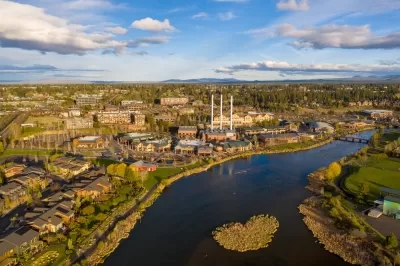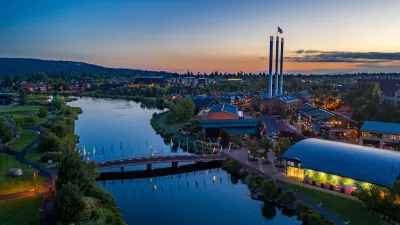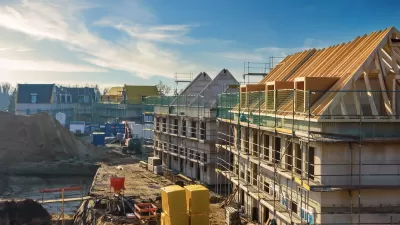Since the 1970s, the state has taken a comprehensive approach to development, regulating land use and urban growth at the state level.

In an article in Bend Source, Jack Harvel describes the unique land use policies that have shaped Oregon development for the past half a century. According to Harvel, “No other state regulates land use to the extent Oregon does, creating a framework for land-use planning that every city and county must adhere to, and is subject to review by the DLCD [Department of Land Conservation and Development].”
Senate Bills 100 and 101, passed in 1973, established the DLCD and seek to preserve open space and farmland and encourage density in cities, in part by establishing urban growth boundaries (UGB) for Oregon cities that promote infill development.
The article details the fraught history of the statewide framework, which have encountered opposition since the beginning, with critics saying that limiting growth drives up housing prices. But according to executive director of Central Oregon LandWatch Ben Gordon, the policy requires the state to build necessary housing and prevents sprawl and “takes into account a number of factors, not just profit.” Harvel writes that the framework “ensures an adequate supply of developable land to meet housing needs while prioritizing the majority of development within the urban growth boundaries.”
FULL STORY: Fifty Years Of Unique Land Use

Alabama: Trump Terminates Settlements for Black Communities Harmed By Raw Sewage
Trump deemed the landmark civil rights agreement “illegal DEI and environmental justice policy.”

Study: Maui’s Plan to Convert Vacation Rentals to Long-Term Housing Could Cause Nearly $1 Billion Economic Loss
The plan would reduce visitor accommodation by 25% resulting in 1,900 jobs lost.

Planetizen Federal Action Tracker
A weekly monitor of how Trump’s orders and actions are impacting planners and planning in America.

Waymo Gets Permission to Map SF’s Market Street
If allowed to operate on the traffic-restricted street, Waymo’s autonomous taxis would have a leg up over ride-hailing competitors — and counter the city’s efforts to grow bike and pedestrian on the thoroughfare.

Parklet Symposium Highlights the Success of Shared Spaces
Parklets got a boost during the Covid-19 pandemic, when the concept was translated to outdoor dining programs that offered restaurants a lifeline during the shutdown.

Federal Homelessness Agency Places Entire Staff on Leave
The U.S. Interagency Council on Homelessness is the only federal agency dedicated to preventing and ending homelessness.
Urban Design for Planners 1: Software Tools
This six-course series explores essential urban design concepts using open source software and equips planners with the tools they need to participate fully in the urban design process.
Planning for Universal Design
Learn the tools for implementing Universal Design in planning regulations.
Caltrans
Smith Gee Studio
Institute for Housing and Urban Development Studies (IHS)
City of Grandview
Harvard GSD Executive Education
Toledo-Lucas County Plan Commissions
Salt Lake City
NYU Wagner Graduate School of Public Service





























